
Alexey Leonidovich Pajitnov is a Russian-born computer engineer and video game designer who is best known for creating, designing, and developing Tetris in 1985 while working at the Dorodnitsyn Computing Centre under the Academy of Sciences of the Soviet Union. After Tetris was released internationally in 1987, he released a sequel in 1989, entitled Welltris.

Wolfram Mathematica is a software system with built-in libraries for several areas of technical computing that allow machine learning, statistics, symbolic computation, data manipulation, network analysis, time series analysis, NLP, optimization, plotting functions and various types of data, implementation of algorithms, creation of user interfaces, and interfacing with programs written in other programming languages. It was conceived by Stephen Wolfram, and is developed by Wolfram Research of Champaign, Illinois. The Wolfram Language is the programming language used in Mathematica. Mathematica 1.0 was released on June 23, 1988 in Champaign, Illinois and Santa Clara, California.

An academic discipline or field of study is a branch of knowledge, taught and researched as part of higher education. A scholar's discipline is commonly defined by the university faculties and learned societies to which they belong and the academic journals in which they publish research.
Educational software is a term used for any computer software that is made for an educational purpose. It encompasses different ranges from language learning software to classroom management software to reference software. The purpose of all this software is to make some part of education more effective and efficient.

Collaboration is the process of two or more people, entities or organizations working together to complete a task or achieve a goal. Collaboration is similar to cooperation. Most collaboration requires leadership, although the form of leadership can be social within a decentralized and egalitarian group. Teams that work collaboratively often access greater resources, recognition and rewards when facing competition for finite resources.
An application program is a computer program designed to carry out a specific task other than one relating to the operation of the computer itself, typically to be used by end-users. Word processors, media players, and accounting software are examples. The collective noun "application software" refers to all applications collectively. The other principal classifications of software are system software, relating to the operation of the computer, and utility software ("utilities").
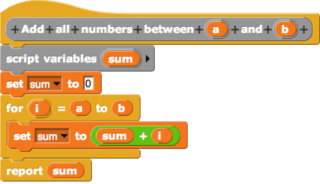
In computing, a visual programming language, also known as diagrammatic programming, graphical programming or block coding, is a programming language that lets users create programs by manipulating program elements graphically rather than by specifying them textually. A VPL allows programming with visual expressions, spatial arrangements of text and graphic symbols, used either as elements of syntax or secondary notation. For example, many VPLs are based on the idea of "boxes and arrows", where boxes or other screen objects are treated as entities, connected by arrows, lines or arcs which represent relations. VPLs are generally the basis of Low-code development platforms.

Open educational resources (OER) are teaching, learning, and research materials intentionally created and licensed to be free for the end user to own, share, and in most cases, modify. The term "OER" describes publicly accessible materials and resources for any user to use, re-mix, improve, and redistribute under some licenses. These are designed to reduce accessibility barriers by implementing best practices in teaching and to be adapted for local unique contexts.

The Coles is a colloquial term referring to Corey Cole and Lori Ann Cole, a husband and wife team who are both video game designers. Working together they designed the Quest for Glory series. They have also each designed games independently.

Idit R. Harel is an Israeli-American entrepreneur and CEO of Globaloria. She is researcher of learning sciences and of constructionist learning-based EdTech interventions.
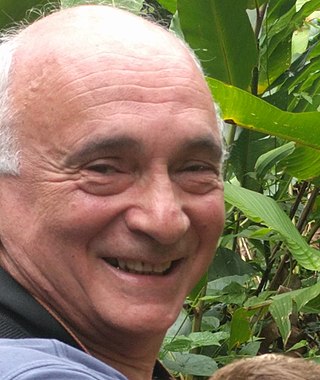
Alexander Bogomolny was a Soviet-born Israeli-American mathematician. He was Professor Emeritus of Mathematics at the University of Iowa, and formerly research fellow at the Moscow Institute of Electronics and Mathematics, senior instructor at Hebrew University and software consultant at Ben Gurion University. He wrote extensively about arithmetic, probability, algebra, geometry, trigonometry and mathematical games.
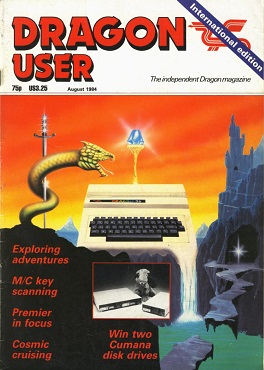
Dragon User was a British magazine for users of the Dragon 32/64 computers published from 1982 by Sunshine Publications. Production of the computers themselves had ceased by 1985 but the user community remained sufficiently active to justify the magazine's continuation until 1989.
The Centre for Distance Learning & Innovation or CDLI is a branch of the Newfoundland and Labrador Department of Education responsible for providing efficient education opportunities to students living in remote areas.
This article covers computer software designed to solve, or assist people in creating or solving, chess problems – puzzles in which pieces are laid out as in a game of chess, and may at times be based upon real games of chess that have been played and recorded, but whose aim is to challenge the problemist to find a solution to the posed situation, within the rules of chess, rather than to play games of chess from the beginning against an opponent.
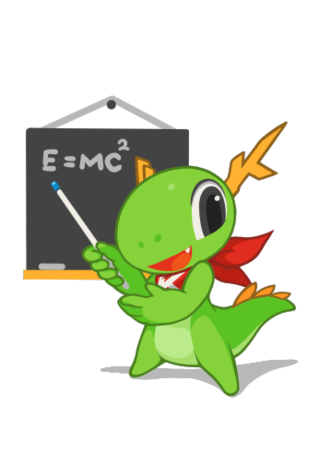
The KDE Education Project develops free educational software based on the KDE technologies for students and parents. These educational software is translated into more than 65 languages, so that users can access them without any problems. The KDE-Edu project also provides free software educational to support and facilitate teachers in planning lessons.
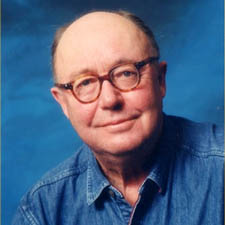
Roger Michael Needham was a British computer scientist.
Ace Centre, previously ACE Centre is a non-profit organization in England that supports people with communications difficulties.

Education and Research Network (ERNET) is an autonomous scientific society of the Ministry of Electronics and Information Technology, Government of India. ERNET has made a significant contribution to the emergence of networking in the country. It practically brought the Internet to India and has built up national capabilities in the area of net-working, especially in protocol software engineering. It is the first internet service in india. It has not only succeeded in building a large network that provides various facilities to the intellectual segment of Indian society—the research and education community, it has over the years become a trendsetter in the field of networking.

A Virtual Learning Environment (VLE) is a system specifically designed to facilitate the management of educational courses by teachers for their students. It predominantly relies on computer hardware and software, enabling distance learning. In North America, this concept is commonly denoted as a "Learning Management System" (LMS).
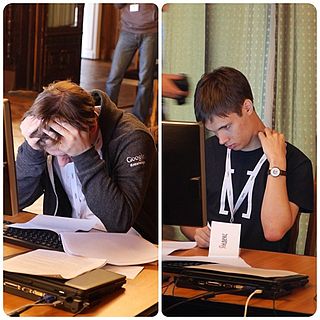
Competitive programming or sport programming is a mind sport involving participants trying to program according to provided specifications. The contests are usually held over the Internet or a local network. Competitive programming is recognized and supported by several multinational software and Internet companies, such as Google and Meta.















